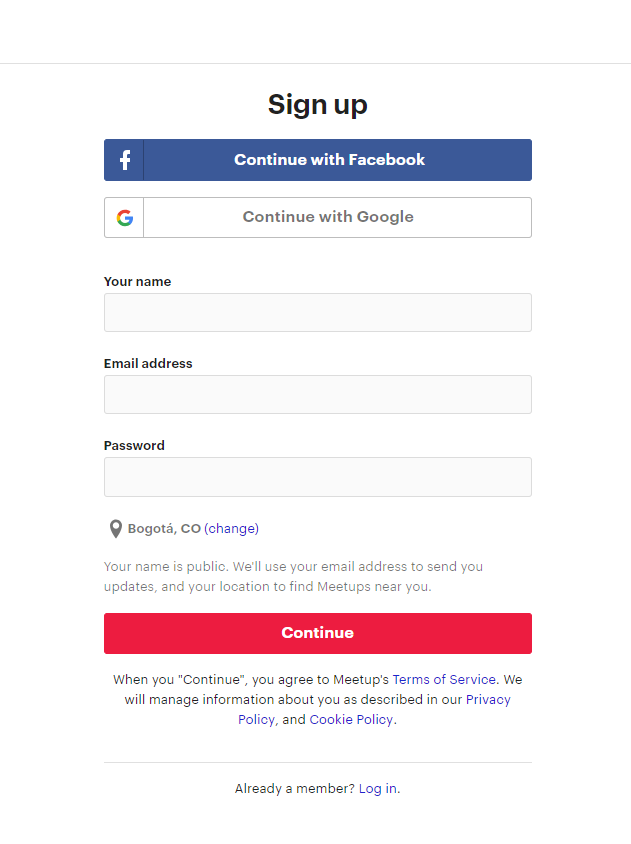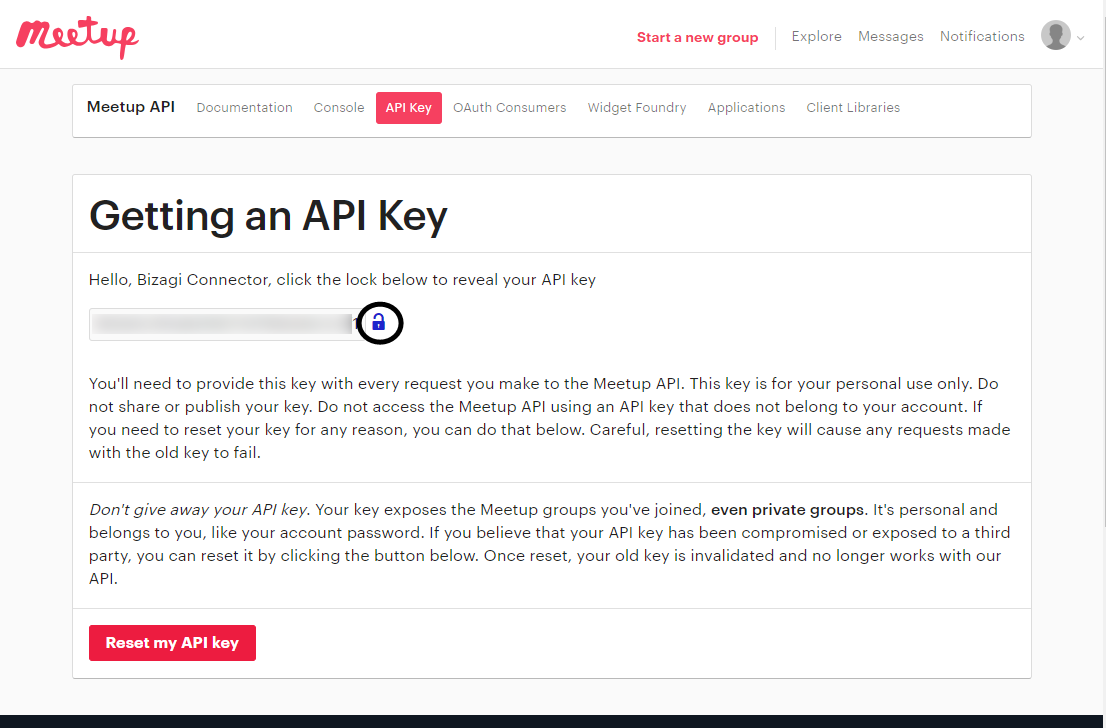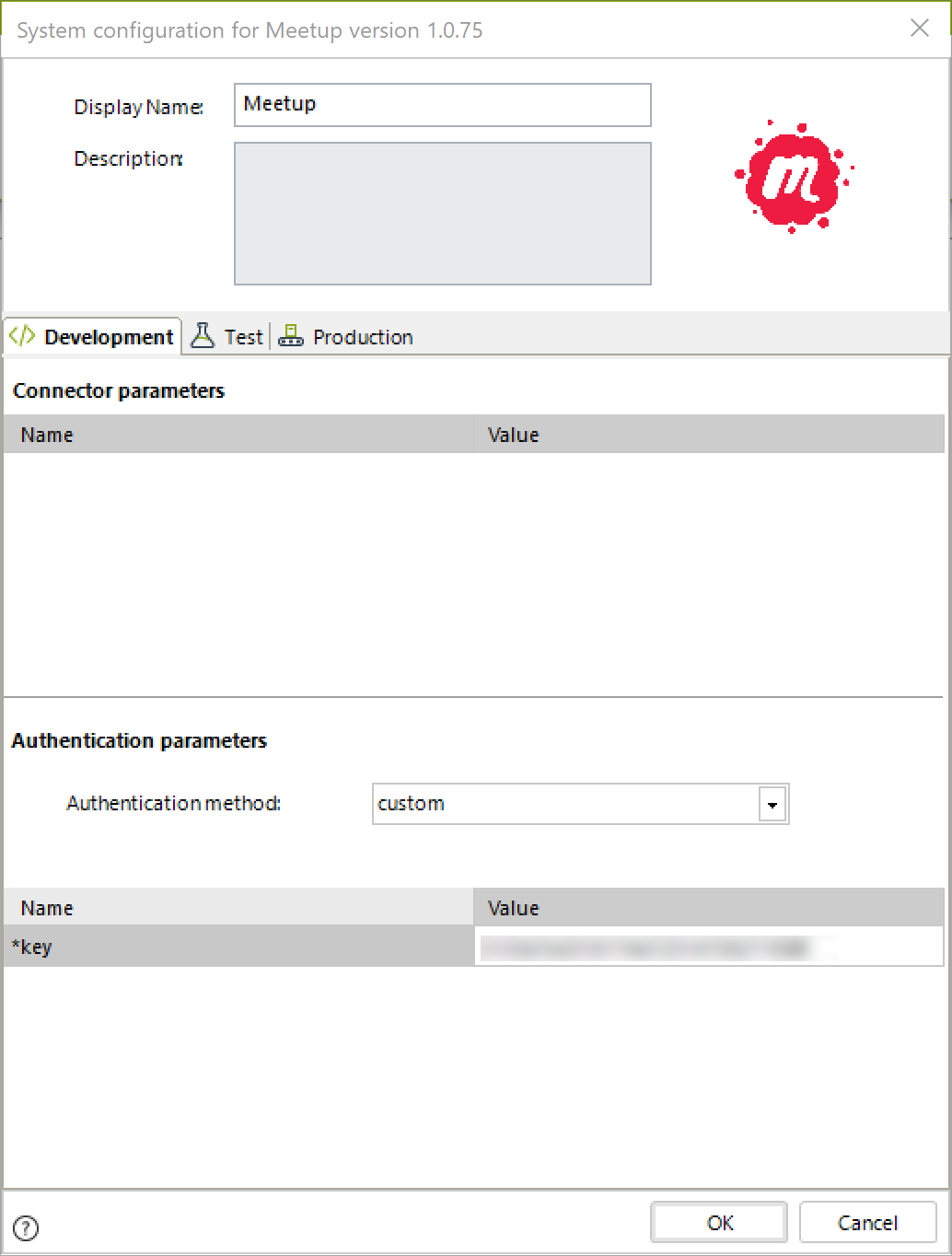Overview
The Meetup connector for Bizagi is available for download at Bizagi Connectors Xchange.
Through this connector, you will be able to connect your Bizagi processes to your Meetup account and services.
For more information about this connector's capabilities, visit Bizagi Connectors Xchange.
|
This Connector was developed according to the contents of the API and the information about it provided by Meetup. Bizagi and its subsidiaries will not provide any kind of guarantee over the content or error caused by calling the API services. Bizagi and its subsidiaries are not responsible for any loss, cost or damage consequence of the calls to Meetup 's API.
This connector is currently on its Beta Version. Use in production environment at your own risk. |
Before You Start
To test and use this connector, you will need:
1.Bizagi Studio previously installed.
2.This connector previously installed, via the Connectors Xchange as described at Bizagi Connectors Xchange article, or through a manual installation as described in the Installing and managing connectors article.
3.An account at https://www.meetup.com/.
4.A secure API key.
Obtain your API Key
To obtain your API key follow these steps:
1.Go to https://secure.meetup.com/en/register/?method=email and chose a Sign-Up method.

2.Register and validate your account. (Remember that you must choose some interest to obtain the best performance from Meetup).
3.Go to https://secure.meetup.com/en-US/meetup_api/key/ and click on the lock to get your API key. Store it in a safe and reachable location.

Configuring the Connector
To configure the connector (in particular its authentication parameters), follow the steps presented at the Configuration chapter in the Installing and managing connectors article.
For this configuration, consider the following authentication parameters:
•Authentication method: Custom.
•Key: your API key generated in the previous section.

Using the Connector
This connector features a set of methods which lets you use Meetup's API services to take advantage of their capabilities.
To learn overall how/where to configure the use of a connector, refer to the Using connectors documentation.
When using the connector, keep in mind the following details for the available methods:
Get Categories
This action gets all the Meetup categories. You don't need to provide any input for this action.
To configure the outputs of this action, you can map the output object to the corresponding entity in Bizagi and make sure you map the attributes of the entity appropriately.
For more information about this method's use, refer to Meetup 's official documentation at https://www.meetup.com/es/meetup_api/docs/2/categories/?uri=%2Fmeetup_api%2Fdocs%2F2%2Fcategories%2F.
Get Cities
This action gets the cities of a specific country. If no country is provided this action searches the country associated with the IP address.
To configure its inputs, take into account the following descriptions:
•country: a valid two-character country code. For example CO, US, PE...
To configure the outputs of this action, you can map the output object to the corresponding entity in Bizagi and make sure you map the attributes of the entity appropriately.
For more information about this method's use, refer to Meetup 's official documentation at https://www.meetup.com/es/meetup_api/docs/2/cities/?uri=%2Fmeetup_api%2Fdocs%2F2%2Fcities%2F.
Get Recommended Groups
This action gets the recommended groups for the user in a specific city, taking into account the categories selected by the user at sign up. If the city is not found this action will fetch the recommended groups in the city associated with the IP address.
To configure its inputs, take into account the following descriptions:
•location: search criteria of the location, it may be a city or a country. For example "USA" or "Bogota".
To configure the outputs of this action, you can map the output array to the corresponding collection in Bizagi and make sure you map the attributes of the entity appropriately.
For more information about this method's use, refer to Meetup 's official documentation at https://www.meetup.com/meetup_api/docs/recommended/groups/.
Get Self Groups
This action gets all the groups the user has joined. You don't need to provide any input for this action.
To configure the outputs of this action, you can map the output array to the corresponding collection in Bizagi and make sure you map the attributes of the entity appropriately.
For more information about this method's use, refer to Meetup 's official documentation at https://www.meetup.com/meetup_api/docs/self/groups/.
Get Group by URL
This action gets a group using its URL name. If the group is not found it returns an error.
To configure its inputs, take into account the following descriptions:
•urlname (Required): URL name of the group. It is the segment of the URL that identifies the group on Meetup. The URL of a group is https://www.meetup.com/name-of-the-group/ and the URL name is the name-of-the-group part. For example, the Bizagi group URL is https://www.meetup.com/Bizagi/ and its URL name is Bizagi.

To configure the outputs of this action, you can map the output object to the corresponding entity in Bizagi and make sure you map the attributes of the entity appropriately.
For more information about this method's use, refer to Meetup 's official documentation at https://www.meetup.com/meetup_api/docs/:urlname/#get.
Get Similar Groups
This action gets similar groups to a group identified by its URL name.
To configure its inputs, take into account the following descriptions:
•urlname (Required): URL name of the group. It is the segment of the URL that identifies the group on Meetup. The URL of a group is https://www.meetup.com/name-of-the-group/ and the URL name is the name-of-the-group part. For example, the Bizagi group URL is https://www.meetup.com/Bizagi/ and its URL name is Bizagi.

To configure the outputs of this action, you can map the output array to the corresponding collection in Bizagi and make sure you map the attributes of the entity appropriately.
For more information about this method's use, refer to Meetup 's official documentation at https://www.meetup.com/meetup_api/docs/:urlname/similar_groups/.
Find Groups
This action gets the groups in a specific city, filtered by text. If the city is not found the method will search for groups in the city associated with the IP address.
To configure its inputs, take into account the following descriptions:
•location: location search term, it can be a city or a country. For example "USA" or "Bogota".
•text: search term
To configure the outputs of this action, you can map the output array to the corresponding collection in Bizagi and make sure you map the attributes of the entity appropriately.
For more information about this method's use, refer to Meetup 's official documentation at https://www.meetup.com/meetup_api/docs/find/groups/.
Get Self Events
This action gets all the events in which the user has participated. You don't need to provide any input for this action.
To configure the outputs of this action, you can map the output array to the corresponding collection in Bizagi and make sure you map the attributes of the entity appropriately.
For more information about this method's use, refer to Meetup 's official documentation at https://www.meetup.com/meetup_api/docs/self/events/.
Get Upcoming Events
This action gets the upcoming events in which the user is subscribed. If the filter fields "text" and "topic_category" yield no results, the action will ignore these filters.
To configure its inputs, take into account the following descriptions:
•end_date_range: this action returns any event that starts before this date. It must follow the following format: YYYYY/MM/DDTHH: MM: SS.
•start_date_range: this action returns any event that starts after this date. It must follow the following format: YYYYY/MM/DDTHH: MM: SS. By default it is the current the date and time.
•topic_category: identificator of the category of the topic to filter recommendations by category.
•text: additional search terms to narrow down the events
To configure the outputs of this action, you can map the output object to the corresponding entity in Bizagi and make sure you map the attributes of the entity appropriately.
For more information about this method's use, refer to Meetup 's official documentation at https://www.meetup.com/meetup_api/docs/find/upcoming_events/.
Get Group Events
This action gets all the events organized by a group.
To configure its inputs, take into account the following descriptions:
•urlname (Required): URL name of the group. It is the segment of the URL that identifies the group on Meetup. The URL of a group is https://www.meetup.com/name-of-the-group/ and the URL name is the name-of-the-group part. For example, the Bizagi group URL is https://www.meetup.com/Bizagi/ and its URL name is Bizagi.

To configure the outputs of this action, you can map the output array to the corresponding collection in Bizagi and make sure you map the attributes of the entity appropriately.
For more information about this method's use, refer to Meetup 's official documentation at https://www.meetup.com/meetup_api/docs/:urlname/events/#list.
Get Group Event By Id
This action gets a specific event.
To configure its inputs, take into account the following descriptions:
•urlname (Required): URL name of the group. It is the segment of the URL that identifies the group on Meetup. The URL of a group is https://www.meetup.com/name-of-the-group/ and the URL name is the name-of-the-group part. For example, the Bizagi group URL is https://www.meetup.com/Bizagi/ and its URL name is Bizagi.

•eventId (Required): id of the event.
To configure the outputs of this action, you can map the output object to the corresponding entity in Bizagi and make sure you map the attributes of the entity appropriately.
For more information about this method's use, refer to Meetup 's official documentation at https://www.meetup.com/meetup_api/docs/:urlname/events/:id/#get.
Get Attendants of an Event
This action gets all the attendees of a closed event. If you select an upcoming event, the method will throw a 400 error.
To configure its inputs, take into account the following descriptions:
•urlname (Required): URL name of the group. It is the segment of the URL that identifies the group on Meetup. The URL of a group is https://www.meetup.com/name-of-the-group/ and the URL name is the name-of-the-group part. For example, the Bizagi group URL is https://www.meetup.com/Bizagi/ and its URL name is Bizagi.

•eventId (Required): id of the event.
To configure the outputs of this action, you can map the output object to the corresponding entity in Bizagi and make sure you map the attributes of the entity appropriately.
For more information about this method's use, refer to Meetup 's official documentation at https://www.meetup.com/meetup_api/docs/:urlname/events/:id/attendance/#list.
Get Self Calendar
This action gets all the events of the groups the user has joined. You don't need to provide any input for this action.
To configure the outputs of this action, you can map the output array to the corresponding collection in Bizagi and make sure you map the attributes of the entity appropriately.
For more information about this method's use, refer to Meetup 's official documentation at https://www.meetup.com/meetup_api/docs/self/calendar/#list.
Get Comments of an Event
This action gets all the comments of a specific event, identified by its id and the urlname of the group owner of the event.
To configure its inputs, take into account the following descriptions:
•urlname (Required): URL name of the group. It is the segment of the URL that identifies the group on Meetup. The URL of a group is https://www.meetup.com/name-of-the-group/ and the URL name is the name-of-the-group part. For example, the Bizagi group URL is https://www.meetup.com/Bizagi/ and its URL name is Bizagi.

•eventId (Required): id of the event.
To configure the outputs of this action, you can map the output array to the corresponding collection in Bizagi and make sure you map the attributes of the entity appropriately.
For more information about this method's use, refer to Meetup 's official documentation at https://www.meetup.com/meetup_api/docs/:urlname/events/:event_id/comments/#list.
Get Recommended Topics
This action gets all the recommended topics based on the user's profile and filtered by the parameter searchText.
To configure its inputs, take into account the following descriptions:
•searchText (Required): additional search terms to narrow down the topics
To configure the outputs of this action, you can map the output array to the corresponding collection in Bizagi and make sure you map the attributes of the entity appropriately.
For more information about this method's use, refer to Meetup 's official documentation at https://www.meetup.com/meetup_api/docs/recommended/group_topics/.
Find Topics
This action gets all the topics that fulfill a search criteria.
To configure its inputs, take into account the following descriptions:
•query (Required): additional search terms to narrow down the topics.
To configure the outputs of this action, you can map the output array to the corresponding collection in Bizagi and make sure you map the attributes of the entity appropriately.
For more information about this method's use, refer to Meetup 's official documentation at https://www.meetup.com/meetup_api/docs/find/topics/.
Get Topic Categories
This action gets all the categories of the topics. You don't need to provide any input for this action.
To configure the outputs of this action, you can map the output array to the corresponding collection in Bizagi and make sure you map the attributes of the entity appropriately.
For more information about this method's use, refer to Meetup 's official documentation at https://www.meetup.com/meetup_api/docs/find/topic_categories/.
Get Dashboard Stats
This action gets the Meetup statistics of the user. You don't need to provide any input for this action.
To configure the outputs of this action, you can map the output object to the corresponding entity in Bizagi and make sure you map the attributes of the entity appropriately.
For more information about this method's use, refer to Meetup 's official documentation at https://www.meetup.com/meetup_api/docs/dashboard/.
Find Venues
This action gets venues based on a search criteria.
To configure its inputs, take into account the following descriptions:
•text (Required): additional search terms to narrow down the venues
To configure the outputs of this action, you can map the output array to the corresponding collection in Bizagi and make sure you map the attributes of the entity appropriately.
For more information about this method's use, refer to Meetup 's official documentation at https://www.meetup.com/meetup_api/docs/find/venues/.
Get Recommended Venues
This action gets the recommended venues for the user based on the IP address associated location and the profile of the user. You don't need to provide any input for this action.
To configure the outputs of this action, you can map the output array to the corresponding collection in Bizagi and make sure you map the attributes of the entity appropriately.
For more information about this method's use, refer to Meetup 's official documentation at https://www.meetup.com/meetup_api/docs/recommended/venues/.
Get Group Venues
This action gets the venues of a group. If the user is not a member of the group and the venue is private, this action will return an error..
To configure its inputs, take into account the following descriptions:
•urlname (Required): URL name of the group. It is the segment of the URL that identifies the group on Meetup. The URL of a group is https://www.meetup.com/name-of-the-group/ and the URL name is the name-of-the-group part. For example, the Bizagi group URL is https://www.meetup.com/Bizagi/ and its URL name is Bizagi.

To configure the outputs of this action, you can map the output array to the corresponding collection in Bizagi and make sure you map the attributes of the entity appropriately.
For more information about this method's use, refer to Meetup 's official documentation at https://www.meetup.com/meetup_api/docs/:urlname/venues/#list.
Get Member
This action gets a member using its id. It returns an error if the member is not found.
To configure its inputs, take into account the following descriptions:
•id (Required): id of the member you need to find
To configure the outputs of this action, you can map the output object to the corresponding entity in Bizagi and make sure you map the attributes of the entity appropriately.
For more information about this method's use, refer to Meetup 's official documentation at https://www.meetup.com/meetup_api/docs/2/member/#get.
Get Group Members
This action gets all the members of the group. If the group is not found this method will return an empty list.
To configure its inputs, take into account the following descriptions:
•group_urlname (Required): URL name of the group. It is the segment of the URL that identifies the group on Meetup. The URL of a group is https://www.meetup.com/name-of-the-group/ and the URL name is the name-of-the-group part. For example, the Bizagi group URL is https://www.meetup.com/Bizagi/ and its URL name is Bizagi.

To configure the outputs of this action, you can map the output array to the corresponding collection in Bizagi and make sure you map the attributes of the entity appropriately.
For more information about this method's use, refer to Meetup 's official documentation at https://www.meetup.com/meetup_api/docs/2/members/.
Last Updated 12/12/2025 10:24:09 AM
